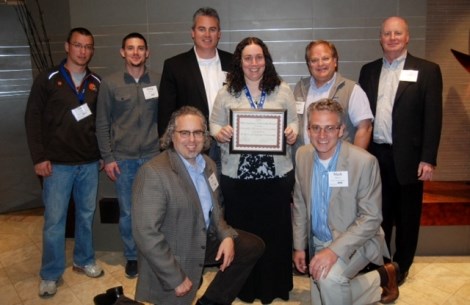Columbia Chemical Receives Employee-Ownership Award
The company began employee stock ownership in 2005 and has been 100 percent employee-owned since 2012.

Eight Columbia employees were present at the OCEO Conference to receive the company’s award for 10 years of employee ownership: (Kneeling in front, l to r) Bill Rosenberg, Jr. and Mark Schario. (Back row, l to r) Tim Lang, Doug Rubino, Brett Larick, Mariann Dance, Martin Gall, and Greg Schneider.
Columbia Chemical Columbia Chemical recently received an Ohio Employee Ownership Award in recognition of 10years of employee ownership.
The company began employee stock ownership in 2005 and has been 100 percent employee-owned since 2012. The award was presented at the Ohio Center for Employee Ownership (OCEO) Conference, which drew a crowd of nearly 400 people.
Columbia Chemical is one of the world’s largest manufacturers of zinc and zinc-alloy plating additives.
For more information, contact Columbia Chemical Corporation, 1000 Western Drive, Brunswick, OH 44212, 330/225-3200, columbiachemical.com
Related Content
-
Top 5 Areas to Consider Automation of Plating Operations
Automation for finishing operations can lead to improvements in process time, repeatability and consistency of quality. Yet, processes that make sense to explore for these operational efficiencies may not always be readily apparent.
-
NASF/AESF Foundation Research Project #122: Electrochemical Approaches to Treatment of PFAS in Plating Wastewater - 7th Quarterly Report
The NASF-AESF Foundation Research Board has selected a project on addressing the problem of PFAS and related chemicals in plating wastewater streams, studying PFAS destruction via electrooxidation and electrocoagulation. Our last report described the results from experiments of EO with a Magnéli phase Ti4O7 anode on the degradation of eight perfluoroalkyl acids (PFAAs). In this seven quarter report, we describe work to further explore how the degradation of different PFAAs are related to their molecular structures.
-
NASF/AESF Foundation Research Project #122: Electrochemical Approaches to Treatment of PFAS in Plating Wastewater - 10th Quarterly Report
The NASF-AESF Foundation Research Board selected a project addressing the problem of PFAS and related chemicals in plating wastewater streams. This report covers the 10th quarter of work (April-June 2023). Here, we examine the effect of surface fluorination of Ti4O7 anodes on PFAS degradation performance in terms of energy performance as well as formation of chlorate and perchlorate when chloride is present in the solution. The full paper on this work can be accessed and printed at short.pfonline.com/NASF24Feb2.














.jpg;maxWidth=300;quality=90)
